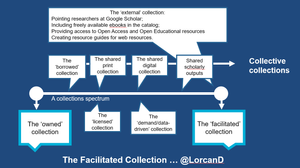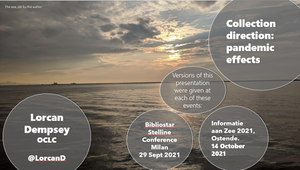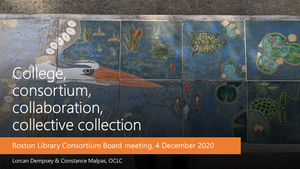 The BBC has been a web innovator, and has a significant international web presence. Tom Coates has a post on a current project looking at user annotation of audio. This was interesting to me for several reasons which touch very closely on current library issues.
The BBC has been a web innovator, and has a significant international web presence. Tom Coates has a post on a current project looking at user annotation of audio. This was interesting to me for several reasons which touch very closely on current library issues.
First, he briefly describes the changing landscape of broadcasting in which hundreds of choices have become available in different delivery modes. He argues that the historical archive of programming is also becoming more popular, and that it will increasingly become available through various on-demand options. We seem to have turned a corner in the library world where recent high profile initiatives underline what was already becoming clear: the book collection will also come onto the network.
Second, he notes that abundance creates discovery issues and that fine-grained metadata is key to helping here. Metadata not only about the asset in question, but about its relationship to other assets and services, and also about “other information streams that give individuals the ability to explore and investigate and assess the media they’ve uncovered.”
Third, given this abundance the choice was to look towards user contributed annotation.
The project we undertook was focused on Annotatable Audio (specifically, but not exclusively, of BBC radio programming) – and we decided to look in an unorthodox direction – towards the possibilities of user-created annotation and metadata. We decided that we wanted to develop an interface that might allow the collective articulation of what a programme or speech or piece of music was about and how it could be divided up and described. Our first ideas looked for approaches similar to del.icio.us, Flickr or our own Phonetags – which create collective value by accreting the numerous annotations that individuals make for their own purposes. But after a fascinating discussion with Jimmy Wales, we decided to think about this in a different way – in which (just like Wikipedia) individuals would overtly cooperate to create something greater and more authoritative. [On the BBC Annotatable Audio project… (plasticbag.org)]
The post goes on to describe the good work they have done, acknowledging that it is in R&D not production.
The library parallel is again clear. We need to do more work to programmatically promote metadata from resources themselves: technical metadata, but also descriptive metadata. We need to leverage existing metadat more (for example, one of the benefits of FRBRization will be the ability to augment existing records with data from other members of the same work set). And we need to move forward with user contributed metadata. Think for example of the task of ‘cataloging’ large amounts of digitized slides and photographs, or of managing the future digital photographic record in the library. Some may be done by the library, but user contribution will help to identify detail and relationships that goes beyond the capacity of the library to provide. Just who is that person in that photograph? Now, this leaves open questions about authority, but all metadata is about assertions whose authority we measure.
Fourth, there is a welcome emphasis on relatedness and context. Assets exist in versions and in relation with other assets and services. And relationship can be usefully surfaced in user interfaces. These topics are addressed more directly in a presentation [pdf] that Coates and colleagues gave earlier this year, which also emphasises the issue of identifiers.
Libraries have different types of metadata across different parts of their collections, and will increasingly have to think about metadata for other entities in their environment (services, collections, institutions, for example). I began by mentioning book digitization intiatives. These are one example of emerging practices which will cause us to review what metadata we have and what metadata we need. For example, although we have rich metadata for books we are not always able reliably to say what the copyright status of a particular item is.
Related entry:



